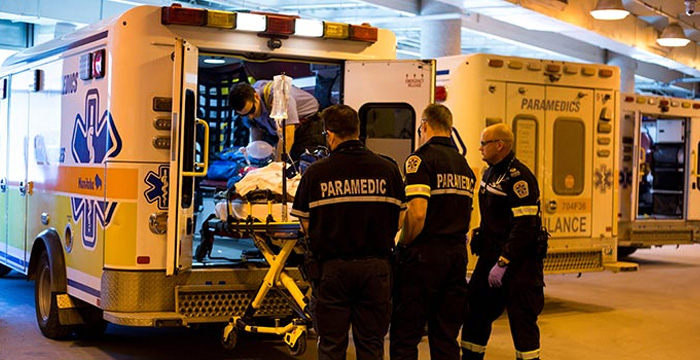The Manitoba government has invested $10 million to purchase 65 replacement ambulances that modernize the province’s fleet, ensure paramedic safety and improve patient comfort.
“We know the right equipment is needed to help paramedics respond quickly and provide quality care for Manitobans who experience a medical emergency,” said Health, Seniors and Active Living Minister Cameron Friesen. “These new ambulances will provide enhanced lighting and additional working space for paramedics so that we can continue to offer consistent, reliable care for patients right across the province.”
The 65 new ambulances, which represent about one-third of the province’s overall fleet, were designed with enhanced patient care in mind. New ambulances feature enhanced lighting, additional working space for paramedics to have better movement and access to patients and increased secure storage compartments for medical equipment.
“Paramedics provide professional, quality care to Manitobans in pre-hospital, community, and inter-hospital settings. For our staff, that means when caring for patients, their workplace is often on-board an ambulance, making the safety and comfort of that vehicle an important priority,” said Helen Clark, chief operating officer, emergency response services, Shared Health.
Through a partnership with Heart & Stroke, all new ambulances will help raise awareness of the signs of stroke and the importance of acting quickly by displaying FAST decals on their back windows.
“Stroke is a medical emergency,” says Christine Houde, director, government relations and health promotion with Heart & Stroke in Manitoba. “Recognizing the FAST signs of stroke and acting quickly can mean the difference between life and death, or the difference between a full recovery and lasting disability.”
The minister noted this investment builds upon the work underway to implement recommendations of the 2013 EMS System Review. To build capacity throughout the system, the province has been investing in additional paramedic positions to enhance staffing levels and reduce reliance on on-call staffing to increase paramedic availability across the province.
Other investments include capital projects that support the delivery of consistent, quality emergency medical services, such as new crew quarters for the Kinosota Trails station in Sandy Bay. The new quarters were completed earlier this fall.
“The 2013 EMS System Review undertook significant consultation with front-line care providers and the recommendations from this report are guiding our investments,” said Friesen. “As part of Manitoba’s broader health system transformation, we are creating a consistent, integrated EMS and patient transport model to build capacity, equip staff and invest in skilled professionals across the province.”
The minister reiterated that restructuring station locations as recommended in the review will not occur until new EMS and patient transport models are in place.




